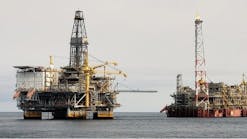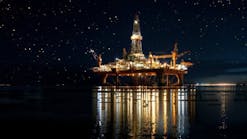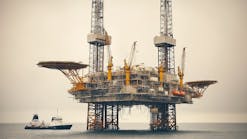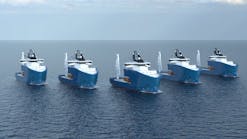Eldon Ball • Houston
Total awards Rosa field subsea contracts
Total has awarded contracts to FMC Kongs- berg Subsea AS, a unit of FMC Technologies, Inc., to supply subsea systems for the Rosa project offshore Angola. The total value of the contracts is approximately $120 million.
The contracts include 18 subsea trees, manifolds, production controls, and associated systems. FMC Technologies also will supply technical services related to installation and startup. The FMC Kongsberg Subsea operations in Angola will support the supply of equipment, including local content. The company will begin deliveries early next year and complete them over a multi-year period.
The Rosa field development offshore Angola will be similar to this layout of the Girassol field. The subsea production system comprises wellheads, subsea trees, manifolds, flowline connection systems, and control and well intervention equipment based on FMC Kongsberg Subsea's modular guideline-less and remotely operated technologies. Total AS will produce hydrocarbons via the subsea production system to the Girassol FPSO.
null
The Rosa field is 15 km from the Girassol FPSO system in block 17 in 4,200 to 4,900 ft of water. The field will come onstream in the first half of 2007, and it will raise and prolong the peak production of the FPSO.
Sociedade Nacional de Combustíveis de Angola (Sonangol) is the block 17 concessionaire. In addition to Total, other participants in the block are Esso Exploration Angola (block 17) Ltd., BP Exploration (Angola) Ltd., Statoil Angola block 17 AS, and Norsk Hydro. The Rosa development is a tieback to the Girassol field, another Total project for which FMC Technologies supplied the subsea production systems.
"This contract award reaffirms FMC Technologies' experience in and commitment to offshore West Africa," said Peter D. Kinnear, executive vice president – FMC Technologies.
Petrobras, Statoil award subsea processing studies
Two national oil companies have contracted FMC Technologies to perform studies to advance subsea separation and processing technologies under development.
FMC designed the two studies – sponsored by Petrobras and Statoil – to demonstrate the qualifications of separation tech- nology for subsea applications. The company will also employ related subsea processing technologies in the studies.
FMC will perform the Petrobras study over a two-year period, and the Statoil study by year-end 2004.
FMC Technologies has been conducting research and development activities in subsea processing technology for several years. In 2003, the company advanced this effort with the acquisition of controlling interest in CDS Engineering, a provider of gas and liquids separation technology and equipment for both onshore and offshore applications and floating production systems.
According to FMC Technologies, subsea processing is an emerging technology that offers value-adding benefits for a range of subsea-developed fields, both as retrofit installation in producing fields or as part of the initial development of new fields or tie-ins. For mature fields, subsea processing typically offers bulk water removal and/or pressure boosting, thereby overcoming constraints in topside processing capacities or declining wellhead pressures. This accelerates produc-tion and enhances recovery, particularly in cases of great water depth and/or limitations in the flowline hydraulic capacities.
For new developments, subsea processing provides separation and/or boosting as a tool to mitigate flow assurance challenges associated with long tie-back distances and ultra-deep waters. This includes de-watering, which reduces the need for hydrate control; gas/liquid separation, which allows split transport; and pumping/compression, which overcomes the pressure losses in the flowlines.
Pemex commissions Lobina pipeline project
Pemex Exploration and Production has issued a letter of intent to Global Offshore Mexico S. de R.L. de C.V., a unit of Global Industries Ltd., for installation of four pipelines totaling 50 km as part of the Lobina project in Mexico's Bay of Campeche.
One 6-in., one 12-in., and two 16-in. lines are scheduled for offshore installation in 2005. The contract is valued at approximately $77 million.
"Global Industries, and particularly Global Offshore Mexico, has experienced a high level of bid and award activity during 2004, and this project is indicative of Pemex's capex spending planned for 2005 and 2006," William J. Doré, Global chairman and CEO, says.
The pipelay vessel Sea Constructor, currently based in Carlyss and serving the US Gulf of Mexico, will join the del Carmen-based Shawnee in executing the project.
Global Offshore Malaysia Sdn. Bhd., also a unit of Global Industries, recently signed a day-rate charter agreement with TL Offshore Sdn. Bhd. for the use of the pipelay barges DLB 264 and DLB 332 as part of TLO's 2004- 2006 Malaysia work program. The DLB 264 and DLB 332 will work for Petronas Carigali, Sarawak Shell Berhad, and ExxonMobil Malaysia.
"The DLB 264 and DLB 332 are well suited to this type of work in Malaysian waters," Doré says. "The companies involved are familiar with the DLB 264's pipelay history as well as the vessel's 1,100-short-ton lift capability. In 2001, the barge set a company pipelay productivity record for 40-in. diameter pipelines for Brunei Shell's Ampa Fairley rationalization project. The DLB 264 recently completed installation of a 14-in. corrosion resistant alloy (CRA) pipeline for Sarawak Shell. Earlier this year, the DLB 332 successfully completed the KBR/Chevron Bench-amas BPEP shutdown project in Thailand and Global was cited for the operation's safety and professionalism."






